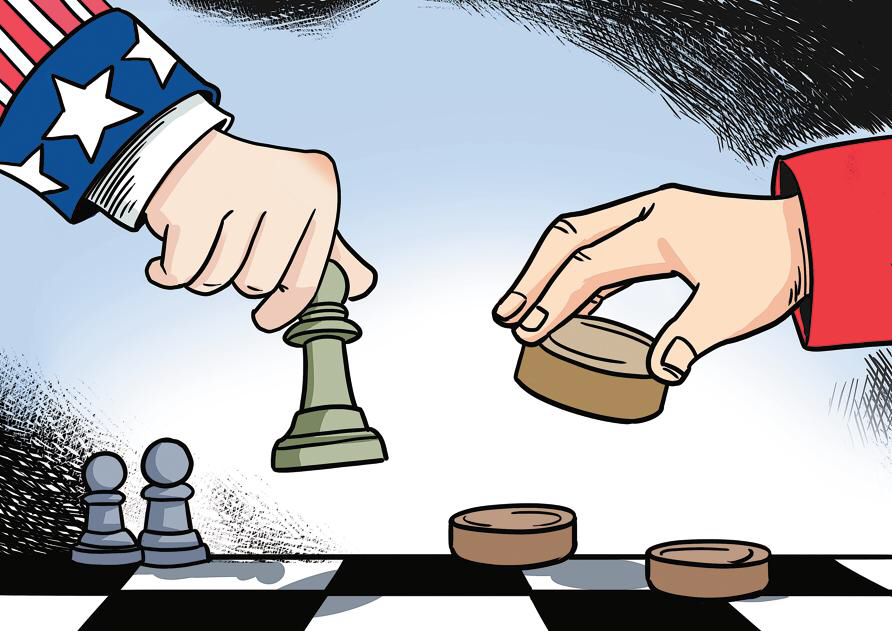Published: February 13,2022
By Dennis Meng

Illustration: SHI YU/CHINA DAILY
The epic war (431 to 405 BCE) between Athens and Sparta, chronicled by Athenian historian Thucydides in his History of the Peloponnesian War, was as inevitable as it was atrocious. The two sides were at daggers drawn for decades prior to the battle, and most importantly—as Thucydides, who himself served as a general during the war, indicated—they constituted the curse of inescapable clashes: a ruling power and a rising power.
Scholars and experts have since resorted to Thucydides’ account to decipher historical conflicts (e.g., the two world wars) and predict future ones. Among them is American political scientist Graham Allison, who invented the famous Thucydides Trap to describe a prospective conflict between the world’s two biggest economies—the US and China.
A decade has passed since Mr. Allision coined the term, and yet the two nations have shown little tendency towards falling victim to the trap. True, the China-US relations have encountered occasional obstacles over the course of the past decade, but most of these are predictable and manageable; and leaders from both sides have on multiple occasions cautioned against any kind of conflict. Even at a time when the US is throwing its trade and diplomacy tantrums, China has exercised considerable restraint and made its utmost efforts to steer the bilateral relations away from unrepairable rupture.
That, however, doesn’t stop some US politicians and media outlets from incessantly rehashing the misconception that the China threat is looming on the horizon and that unless the US acts forcefully to squash it, the superpower is going to lose big.
Is this really the case?
If we pay heed to America’s record of demonizing and bullying the no.2 nation in the name of curbing external threats (to American jobs, national security, or the so-called “American values”) we will find that most of its “threat narratives” have been established on the same perpetual fear that an ascendant runner-up nation will outcompete the superpower and eventually imperil its supremacy.
It was with that unprovoked paranoia, combined with its zero-sum mindset, that the US had wielded its big stick to stifle competition from Germany, Japan, and the EU in the past. Trade tariffs, exclusion bills, sanctions, delisting, xenophobic propaganda, etc.—these aren’t new inventions designed to target China, but old practices borrowed from its past triumphs.
However, by forging a resemblance between China and America’s previous “challengers” and crying wolf over it, the US has fundamentally mistaken the reality of the situation and miscalculated China’s intention.
China is by no means on par with the US economically and therefore shouldn’t be falsely portrayed as the latter’s rival. American pundits are fixated on citing the GDP, trade volumes, and foreign exchange reserves as evidence of the mounting “China threat,” but what they refuse to acknowledge is the fact that all the aforementioned metrics, once divided by 1.4 billion, will send China to the middle-income country category.
As Chinese Vice Foreign Minister Le Yuchengcorrectly pointed out at the Macro Situation Annual Forum held in Beijing on January 18 that, some one billion Chinese have never flown in an airplane, over 200 million Chinese families don’t have a flush toilet, and only less than 4% of Chinese people have a college degree (by contrast, around one in four Americans have one). China, after all, still is, and will remain for the foreseeable future, a developing country.
Poverty relief assistants Liu Ying (1st L) and He Changle (2nd L), as well as village officers, help carry melons planted by villagers in Dongqin Village, Congjiang County of southwest China’s Guizhou Province, Nov. 11, 2020. (Xinhua/Yang Wenbin)
Another reason why China is on no trajectory to dethrone the US from its position of global supremacy is that China has never harbored such an intention. Having just lifted all its people out of poverty and built itself into a moderately prosperous society, China remains preoccupied with its own agenda—that is, meeting people’s aspirations for a better life—rather than involving itself in unrealistic and costly contentions for power.
On the other hand, as a staunch supporter of multilateralism, China has long been committed to building a community of a shared future for mankind, instead of embracing isolationism and hegemony for geopolitical gains. In practice, China’s policymaking revolves around its people, not a single political party; and its global presence is focused on delivering benefits for the whole world, rather than a particular alliance of nations.
China and the US are like two poles apart celestial bodies—one is revolving on its own axis and along the common orbit, while the other is engrossed with creating its own system and order. How could the two possibly collide?
It is wise to draw lessons from history. But blindly drawing parallels between the past and the present and acting accordingly is imprudent and dangerous. China-US relations have nothing in common with previous declining-and-rising-powers relations. China, in its long history, has never been a hegemon. It has never initiated wars or invaded foreign lands. It seeks no regional clout or geopolitical sway. It cares more about the interests of its own people and the universally recognized norms and values than outcompeting any other nation.
Therefore, it is beyond all reason for the US to designate China as the major player of its competition game when China, which has been engrossed with its own mission, is averse to join. On Feb. 4, the US government passed the so-called “China Competition Bill,” a multibillion-dollar package designed to cement its “economic competitiveness.” The passage of the bill came as no surprise since the only bills that can be greenlighted in US Congress nowadays are all about China.
As the Wall Street Journal pungently pointed out, it is a “Be More Like China Act,” a duplicate of China’s “industrial policy.” The bill, together with other China-focused bills proposed by the Biden Administration, gets only one thing right: touching upon domestic affairs and people’s welfares.
Those bills, whatever their hidden agenda, at least remind the US government that there are still roads to be rebuilt, bridges to be fixed, inflation to be curbed, and climate puzzles to be solved. But the US should understand that the China threat rhetoric isn’t the cure for any of these problems, and obsessing with power contention narratives won’t help the US to avert Thucydides Trap (or any traps), it will only get the US struck in the Thucydides Trap trap: its persistent zero-sum mindset.
 Africa -China Review Africa -China Cooperation and Transformation
Africa -China Review Africa -China Cooperation and Transformation
